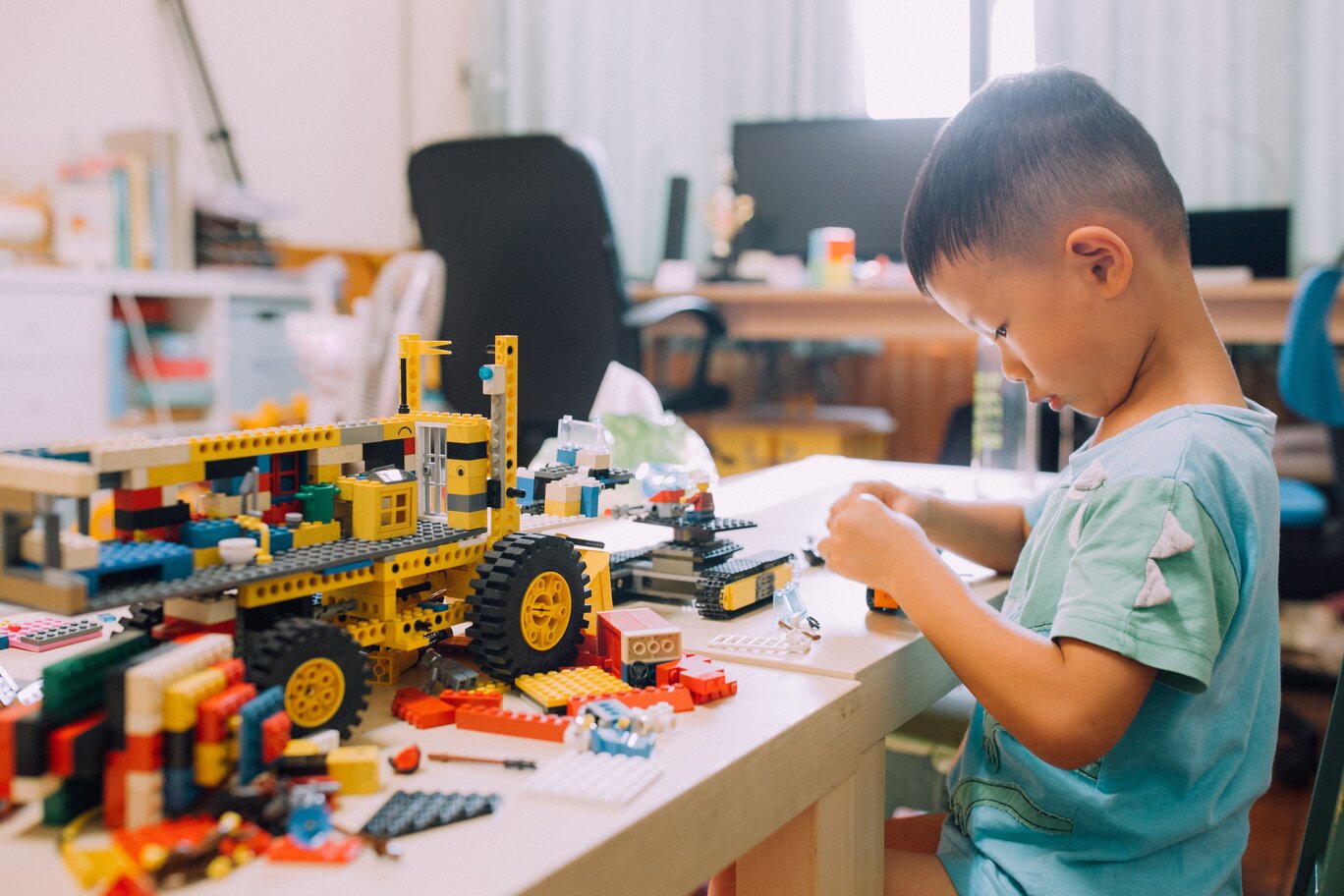As a parent or a caregiver, ideally you would want to provide the best environment for your child’s development all around. One of the most critical aspects of early childhood development is cognitive development. Cognitive development is the process of how a kid learns, thinks, and problem-solves in their life. In this blog post, we will be discussing the importance of cognitive development, the factors that influence it, and how you can promote better cognitive development in your child.
What is Cognitive Development?
Cognitive development is the process through which children learn to think, reason, and understand the world around them. This process includes the development of language, perception, memory, attention, and problem-solving skills. Cognitive development process starts at birth and continues through adolescence.
The Importance of Cognitive Development in Early Childhood
Cognitive development in early childhood is crucial as it sets the foundation for future learning and academic success. It helps children develop critical thinking skills and the ability to solve problems independently. It also supports language development, memory, and attention, which are essential for learning and communication.
Factors of Cognitive Development in Early Childhood
Several factors can impact a child’s cognitive development in early childhood. These include genetics, environment, nutrition, and experiences. Exposure to positive experiences, such as rich language, engaging activities, and stimulating environments, can have a significant impact on cognitive development.
Come along with 200k+ families!
Explore the endless possibilities of learning!
Download for Free.
How to Promote Cognitive Development in Early Childhood
Here are ten ways you can promote cognitive development in your child:
1. Stimulate your child’s senses
One of the best ways to promote cognitive development in your child is to stimulate their senses. Engaging all five senses, including sight, sound, taste, touch, and smell, can help build neural connections in the brain. Some activities you can do to stimulate your child’s senses include:
- Sensory bins: Fill a bin with different materials, such as rice, beans, or sand, and let your child explore by touch.
- Scavenger hunt: Create a scavenger hunt with items of different textures and colors for your child to find.
- Cooking: Encourage your child to help with cooking and let them smell and taste different ingredients.

2. Encourage your child to explore and experiment
Encouraging your child to explore and experiment can help develop their curiosity, creativity, and problem-solving skills. Some activities to encourage exploration and experimentation include:
- Nature walks: Take your child on a nature walk and encourage them to observe their surroundings and ask questions.
- Science experiments: Do simple science experiments at home with your child, such as making slime or mixing baking soda and vinegar.
- Block play: Provide your child with blocks of different shapes and sizes to build and experiment with.
3. Promote pretend play
Pretend play is an essential aspect of cognitive development, as it allows children to use their imagination and develop social skills. Some pretend play activities include:
- Dress-up: Provide your child with costumes and encourage them to play different roles and characters.
- Doll play: Provide your child with dolls or action figures and encourage them to create stories and scenarios.
- Play kitchen: Set up a play kitchen with utensils, food, and dishes for your child to pretend cook and serve.

4. Encourage your child to solve problems
Problem-solving skills are essential for cognitive development for kids. If you want to help your child develop their logical thinking, reasoning, and decision-making skills, it is a great idea to encourage them to solve problems. The best way to do this is by providing them with age-appropriate challenges and letting them figure out how to solve them on their own.
For toddlers, you can start with simple puzzles or sorting games. As they get older, you can introduce more complex challenges like building blocks or shape-sorting toys. Encourage them to think through the problem and come up with a solution on their own. If they get stuck, you can offer hints or guidance, but try to let them figure it out themselves as much as possible.
Play can also be a great tool when it comes to teaching and developing problem-solving skills. You can set up a treasure hunt or scavenger hunt and give your child clues to follow to find the treasure. This activity not only helps with problem-solving but also promotes physical activity and creativity.
Another way to encourage problem-solving is by playing board games or card games with your child. These games require strategic thinking and decision-making, which can help improve their cognitive abilities.
5. Read with your child
Reading is one of the best ways to promote the cognitive development of your kiddo. This activity not only helps with language development but also improves memory, concentration, and critical thinking skills. By reading regularly with your child, you can help them develop a love for learning and a lifelong passion for reading.

When reading with your child, it is possible to make it a fun and interactive experience. Encourage them to ask questions, make predictions, and draw connections between the story and their own experiences. You can also use different voices and sound effects to make the story come alive, essentially making the whole process a bit more fun and engaging.
To make the most of reading time, choose age-appropriate books and set aside a regular time each day for reading. Make it a special time for you and your child to bond and enjoy learning together.
6. Limit screen time
Excessive screen time can have negative effects on cognitive development in young children. While some educational programs and apps can be beneficial, too much screen time can lead to poor social skills, language delays, and decreased attention span.
To promote cognitive development, it is important to limit your child’s screen time and encourage other activities instead. Set aside time each day for active play, reading, and other learning activities. Be a good role model and limit your own screen time in front of your child.
7. Encourage outdoor play
Children’s cognitive development is aided by time spent playing outside and engaging in other extracurricular activities, which has many positive effects on the child’s health and well-being. Your child’s general health and well-being will benefit from more opportunities for physical activity and interaction through the time spent playing outside.
Enjoying the outdoors doesn’t require a lot of preparation or elaborate planning. Involving your kid frequently in outside activities, such as playing in the garden, park, or playground, will easily do the trick. Provide activities that encourage curiosity and discovery, such as digging in the sand, splashing in the water, collecting pebbles and leaves, and watching wildlife.
Taking your kiddo along on your outdoor adventures is another way you can both benefit from time spent playing and spending time in the fresh air. Hiking, riding, and camping are just a few examples of fun outdoor activities you may do with your kid. You can help your child’s brain grow and strengthen while still spending valuable time together.
8. Provide open-ended toys and games
Open-ended toys and games are those that can be used in a variety of ways and encourage creativity and imagination. Examples include building blocks, art supplies, and dress-up costumes.

These types of toys and games are beneficial for cognitive development because they promote problem-solving, decision-making, and critical thinking skills. They also allow children to express themselves and explore their interests and ideas.
Provide your child with a variety of open-ended toys and games and encourage them to use them in different ways. Offer guidance and support when needed, but let them take the lead and explore their own creativity and imagination.
9. Foster a love for learning
Fostering a love for learning in your child is an important step in promoting their cognitive development. When children enjoy learning, they are more likely to engage with the world around them, seek out new experiences and develop a sense of curiosity and wonder that will stay with them throughout their lives. Here are some tips on how to encourage a love for learning in your child:
- Make learning fun: Learning doesn’t have to be a chore or a task that your little one dreads. By making it fun and engaging, you can help your child develop a positive attitude toward learning. You can incorporate games, songs, and other interactive activities that your child enjoys to make learning more exciting.
- Demonstrate the value of learning to your child: Speak to your child about the importance of learning and how it can help them in all facets of life. This will help kids understand that learning is a lifelong activity, they will learn many things throughout their lives, and it can lead to personal growth and achievement rather than just being good at school.
- Let your kid explore what they like: Encourage your child to explore their interests, whether it’s through books, art, music, or other activities. Everyone has different tastes when it comes to what they really like doing. By allowing your child to explore their interests and providing them opportunity, they will develop a sense of passion and purpose, and they will be more likely to seek out new learning experiences.
- Be a role model: Your child learns by observing and imitating you. If you model a love for learning and are enthusiastic about new experiences and ideas, your child will be more likely to follow in your footsteps.
- Celebrate accomplishments: Celebrate your child’s accomplishments and milestones, no matter how small they may be. This will help your child feel proud of their achievements and motivated to continue learning and growing.
- By fostering a love for learning in your child, you can help them develop the skills and knowledge they need to succeed in school and in life.
10. Encourage healthy habits
Encouraging healthy habits is crucial to promote cognitive development in early childhood. By teaching your child healthy habits, you can help them establish a strong foundation for lifelong well-being. Here are some ways to encourage healthy habits in your child:
- Sleep: Adequate sleep is important for a child’s cognitive development. A lack of sleep can lead to irritability, inattention, and poor memory retention. As a parent, you can establish a regular bedtime routine for your child, set a consistent sleep schedule, and ensure that your child’s sleeping environment is comfortable and conducive to sleep.
- Nutrition: Proper nutrition is essential for cognitive development. A balanced diet can improve a child’s ability to learn and retain information. You can encourage healthy eating habits by providing a variety of nutritious foods, limiting sugary and processed foods, and involving your child in meal planning and preparation.
- Exercise: Physical activity is important not only for a child’s physical health but also for their cognitive development. Regular exercise can help improve memory, attention, and information-processing skills. You can encourage physical activity by providing opportunities for outdoor play, signing your child up for sports or activities, and being active together as a family.
- Encouraging healthy habits is crucial to promote cognitive development in early childhood. Being sick is never fun, and it can take a lot of time to get better and feel oneself again. By teaching your child healthy habits, you can help them establish a strong foundation for lifelong well-being.

- Hygiene: Kids explore with their entire bodies. They touch things, smell things, and sometimes jump around in the mud. this is all good fun, of course! Good hygiene habits can help prevent illness and promote overall well-being. Teach your child the importance of washing their hands regularly, covering their mouth when coughing or sneezing, and avoiding contact with people who are sick.
By encouraging healthy habits in your child, you are not only promoting their physical health but also their cognitive development. These habits will lay the foundation for a healthy and successful future.
Conclusion
In this article, we have explored the importance of cognitive development, as well as how to promote it during early childhood years. Providing your child with several avenues for education, discovery, and play will help in their cognitive growth and create the groundwork for future achievement.
There are many things you can do to help your kiddo improve and develop their cognitive abilities. These include many practices from engaging their senses to fostering social connection and play. You may encourage your child’s growth and development by setting a good example and taking part in mind-stimulating pursuits together.




